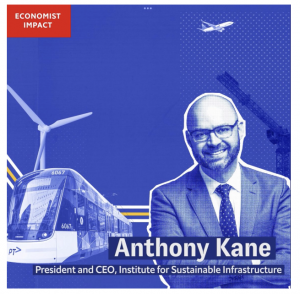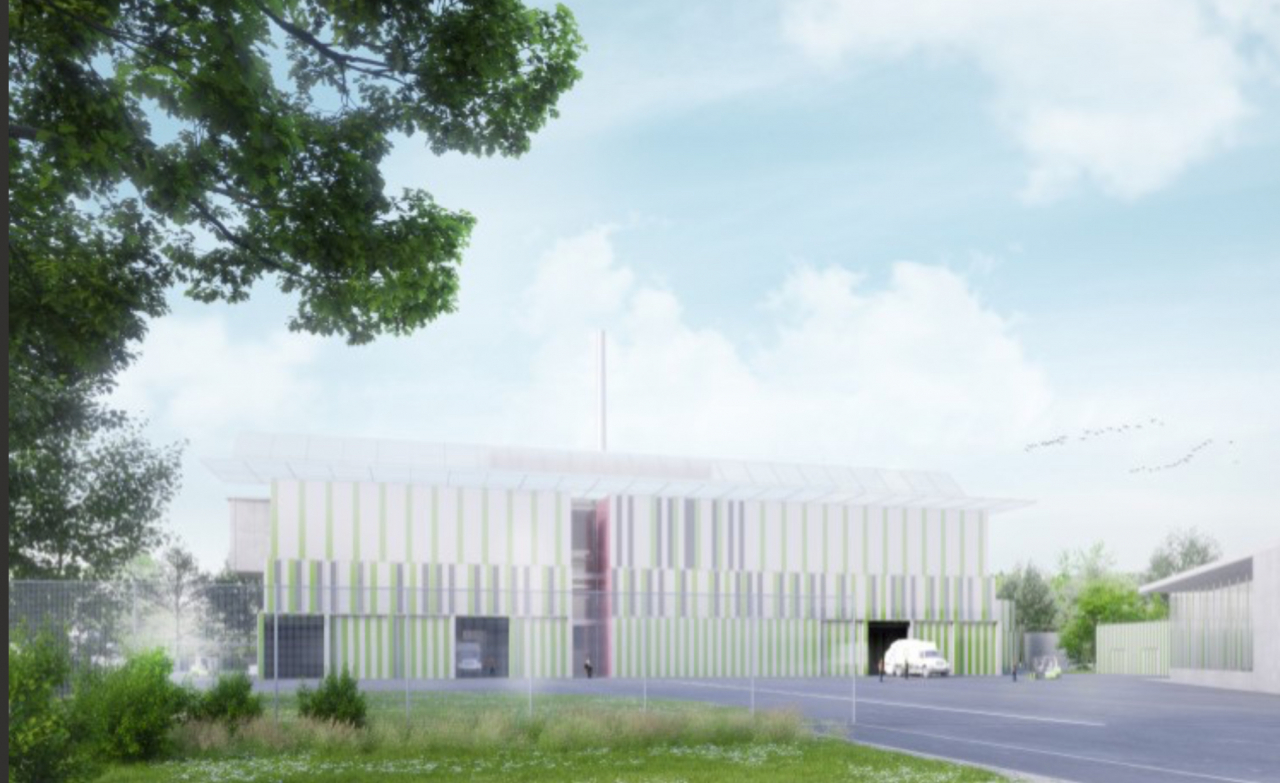 Whether in magazine or podcast format, the Economist produces some of the most influential commentary out there on current affairs and global issues. Recently, ISI’s President & CEO Anthony Kane was featured in the Economist Impact’s “Infrastructure for Good” podcast series, in a discussion that included Rowan Palmer of the UN Environment Program. They were asked by Phillip Cornell, Principal, Economist Impact Series to explore how infrastructure can achieve better socioeconomic impacts and environmental resilience.
Whether in magazine or podcast format, the Economist produces some of the most influential commentary out there on current affairs and global issues. Recently, ISI’s President & CEO Anthony Kane was featured in the Economist Impact’s “Infrastructure for Good” podcast series, in a discussion that included Rowan Palmer of the UN Environment Program. They were asked by Phillip Cornell, Principal, Economist Impact Series to explore how infrastructure can achieve better socioeconomic impacts and environmental resilience.
Here are some quotes from the podcast, which can be accessed in the button further down.
_________________
“Very often natural infrastructure assets are providing protective services, things like slope stabilization or flood protection for example, to built assets; so any climate risk to these natural assets can have knock-on effects of increasing risks to the built assets that benefit from the protective services. This means that it’s really important when trying to understand climate risk to look at these two things together and understand the relationship.”
— Rowan Palmer, on the crucial importance of nature-based infrastructure assets.
“[To respond to the need for resilience,] the ideal is to have a community-wide integrated resilience plan, but projects are delivered at the project level. So you have to have a two-way communication and coordination there that can be very complex. The individual projects have to be resilient, but in the case of infrastructure, they’re always connected to a larger system and the system has to be resilient. That system in turn exists to serve the community and so the community has to be resilient.”
— Anthony Kane highlights interlinkages at the project environment and system level adding complexity to infrastructure development.
“Right now, we’re getting a kind of a piecemeal approach where sometimes the system is resilient; sometimes the project is resilient. But we know in failure situations, all it takes is one weak link and the system is down, and then the community is in a position where they’re potentially at risk. That’s where the challenge is right now, within our existing governance, funding, planning systems: how do we take these both comprehensive views and project-by-project views in embedding resilience.”
— Kane, on one of the key constraints of the current infrastructure development environment.
“It’s really important to ensure the benefits of services [from civil infrastructure] are delivered fairly so that the different parts of a society or community have access to the services they need. A big issue is the issue of gender, and in many cases, men and women use infrastructure services differently, and so it’s important to ensure that infrastructure systems are designed and operated with these differences in mind. A good example is transportation infrastructure. In so many places, men and women have different patterns of mobility often related to the types of work they do, or their livelihoods…”
— Cornell, explaining sustainability from a social resilience perspective.
“There is an environmental dimension to social sustainability…related to the right to a healthy environment and the fact that some communities, and particularly indigenous communities, are more reliant on a natural infrastructure and nature to deliver critical services and livelihoods than other communities might be.”
— Cornell on the components that make an infrastructure asset “good for the community.”
“It starts with having very strong and robust stakeholder engagement. Are we communicating, not in terms of the technical solutions that are being provided, but in the value that the community that is being served is receiving? And do they understand that; do they understand the trade-offs; do we on the design side understand the make-up, the needs, the values, the goals, of the community — the culture of the community — and are we incorporating that into designs? Because the greatest technical solution is not going to reach his potential if the community doesn’t want, or does not use, the infrastructure in the way it was intended.”
— Kane, on the importance of stakeholder engagement.
“In the future I see a model whereby we are more sophisticated at understanding the value of these multi-benefit projects — sharing the costs and then sharing the benefits. It makes economic sense that way, but our systems are not set up [optimally] right now, so it’s still a bit of a hurdle for individual agencies or owners to realize the benefits that they’re delivering. That pushes them back into a more traditional model of ‘one problem–one solution/cheapest-cost solution’ that’s not delivering the value. I think that taking a broader economic view of the projects, of their impacts, the value that’s being delivered, and finding governance structures and funding structures that facilitate that would make a huge impact.”
— Kane, on what might be on the horizon for the current approach to delivering projects that yield multiple benefits.
 An innovative waste-to-energy plant in the Milan-area municipality of Sesto San Giovanni is the latest project to be awarded Envision Platinum in Italy, through ISI’s Italian partner ICMQ. With two production lines that combine waste treatment and water purification, the BioPiattaforma plant establishes a more sustainable, environmentally friendly process based on circular economy principles and the goal of regional self-sufficiency in waste management.
An innovative waste-to-energy plant in the Milan-area municipality of Sesto San Giovanni is the latest project to be awarded Envision Platinum in Italy, through ISI’s Italian partner ICMQ. With two production lines that combine waste treatment and water purification, the BioPiattaforma plant establishes a more sustainable, environmentally friendly process based on circular economy principles and the goal of regional self-sufficiency in waste management.



